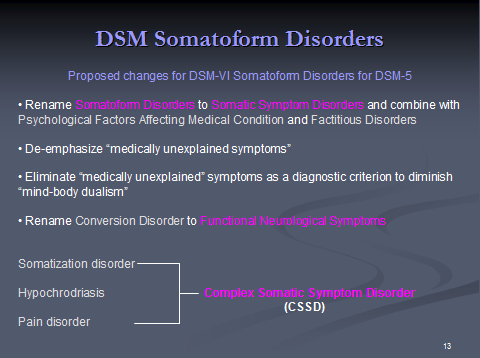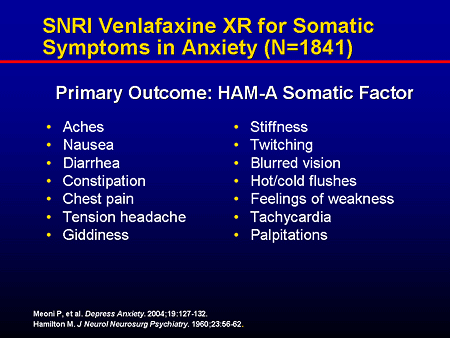
Why is somatic symptom disorder a difficult diagnosis? How do you treat somatic symptoms? What is somatic diagnosis? You may or may not have another diagnosed medical condition associated with these symptoms, but your reaction to the symptoms is not normal. A somatic symptom disorder , formerly known as a somatoform disorder , is any mental disorder that manifests as physical symptoms that suggest illness or injury, but cannot be explained fully by a general medical condition or by the direct effect of a substance, and are not attributable to another mental disorder (e.g., panic disorder ). The person has such intense thoughts, feelings, and behaviors related to the symptoms, that they feel they cannot do some of the activities of daily life.

Somatic symptom disorder (SSD) occurs when a person feels extreme, exaggerated anxiety about physical symptoms. They may believe routine medical problems are life threatening. While somatic symptom disorder benefits from professional treatment, you can take some lifestyle and self-care steps, including these: Work with your care providers. Work with your medical care provider and mental health professional to determine a regular schedule for visits to discuss your concerns and build a trusting relationship. A main goal of somatic symptom disorder treatment is to help patients live and function as normally as possible, even if they continue to have symptoms.
This preoccupation with physical symptoms causes significant. Treatment also aims to alter the thinking. The main symptom of somatic symptom disorder is the belief that you have a medical condition, which you may not actually have. These conditions range from mild to severe and general to very specific.
It can last for many years. Although there is no way to prevent this disorder , a correct diagnosis of somatic symptom disorder can help the person avoid excessive medical testing. Somatization disorder is a mental disorder characterized by recurring, multiple, and current, clinically significant complaints about somatic symptoms. It was recognized in the DSM-IV-TR classification system, but in the latest version DSM- it was combined with undifferentiated somatoform disorder to become somatic symptom disorder , a diagnosis which no longer requires a specific number of. Recent literature has used the terms somatisation disorder , somatic symptom disorder , functional somatic syndromes and somatisation syndromes more or less interchangeably.
There are different subtypes of the disorder based on the patient’s complaint. Somatic Symptom Disorder is a psychiatric condition that includes physical symptoms. Someone with this disorder has a genuine medical condition but has developed psychological symptoms that are not part of the normal course of the illness. Someone with a somatic symptom disorder (SSD) experiences physical symptoms, such as pain or fatigue, which cannot be fully explained by (1) a general medical condition, (2) substance use, or (3) another mental disorder.

The somatic symptoms are either very distressing or result in significant disruption of functioning. Patients presenting with symptoms and features suggestive of a somatic symptom disorder should undergo a full diagnostic workup before applying the DSM-criteria to confirm the diagnosis. The mind can have a powerful effect on how the body functions, which can lead to many quality of life problems when things go wrong.
Depending on the specific disorder , the origin of the symptoms may be conscious or unconscious and may be fueled by a desire to assume the role of a sick patient. A person is not diagnosed with somatic symptom disorder solely because a medical cause can’t be identified for a physical symptom. The emphasis is on the extent to which the thoughts, feelings and behaviors related to the illness are excessive or out of proportion.
This somatic symptom disorder test can be used to see whether or not you may meet the criteria for somatic symptom disorder (SSD). However, this questionnaire can not be used as a diagnostic tool and does not provide conclusive advice regarding your mental state, however, this somatic symptom disorder test could point you in the right direction regarding treatment. Well, SSD or somatic symptom disorder is a relatively young mental health disorder.
From the root word: soma, which means ‘body,’ somatic symptom disorder is a body symptom mental health disorder. The symptoms are not intentionally produced or feigned and may or may not accompany known medical illness.
No comments:
Post a Comment
Note: Only a member of this blog may post a comment.